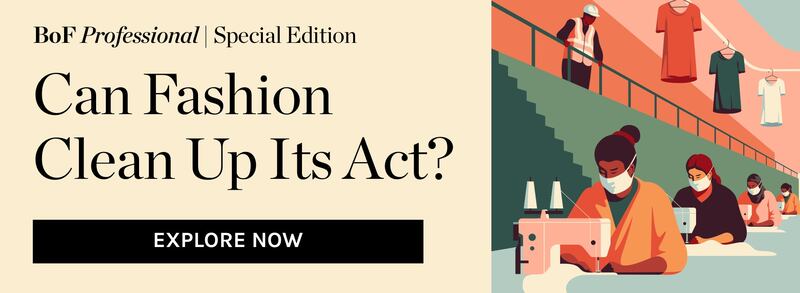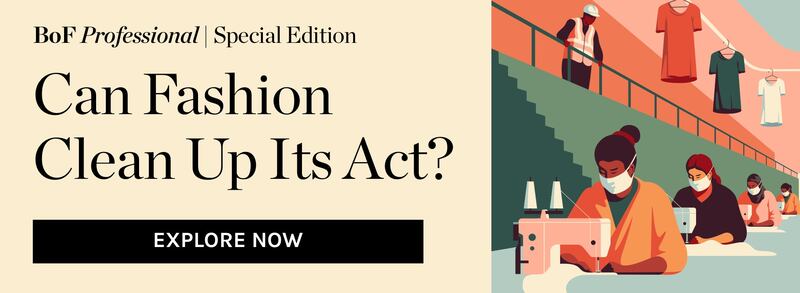
The Business of Fashion
Agenda-setting intelligence, analysis and advice for the global fashion community.

Agenda-setting intelligence, analysis and advice for the global fashion community.

The author has shared a YouTube video.
You will need to accept and consent to the use of cookies and similar technologies by our third-party partners (including: YouTube, Instagram or Twitter), in order to view embedded content in this article and others you may visit in future.

As part of our latest Special Edition, BoF has produced a series of video articles with entrepreneurs and business owners on how to build a responsible business. Hear from The Rebel, The Upcycler, The Anti-Consumptionist, The Manufacturer and The Social Good Brand and explore the Special Edition here.
STOCKHOLM, Sweden — By accelerating change across retail and forcing consumers to reckon with their spending habits, the pandemic has brought about existential crises for many fashion businesses.
But for August Bard Bringéus, co-founder of Swedish menswear brand Asket, the crisis has only reinforced his company’s purpose: to end the era of fast consumption by encouraging people to buy fewer, but better, garments.
“It has forced us to realise what actually matters to us... you don't need to replace your outfits for this or that event,” Bringéus told BoF. “I definitely think that this has sparked some kind of realisation that we can be happy without the constant search for material satisfaction.”
ADVERTISEMENT
The company saw conversion rates dip around 70 percent after the crisis took hold in March. Figures normalised to around a 30 percent decline, “which is better than we feared,” he said. Here’s how Bringéus and his team are weathering the current crisis.
No business is an island. Bringéus and his team have been working closely with factory partners in Portugal and Italy to be flexible and take in as much inventory as possible from smaller producers while turning to bigger players for help and financing. "[We're] trying to redistribute cash flows across the supply chain, to make sure that we come out of this with these fantastic factories because we'll need them when this is over."
Take stock and hibernate. Though stock build-up is tricky for cash flow, Asket's seasonless offering — its business model centres around a permanent collection — has protected it from the need to write down or discount any inventory. "We just need to hibernate. And then it'll sell slower, but it will still sell."
Think of the bigger picture. To Bringéus, running a responsible business means "every decision that you take needs to consider the sum of its impact across the whole value chain, not just the supply chain." Assuming responsibility throughout — from design and material sourcing to production facilities, to working conditions and distribution to marketing — demands a holistic approach. In late April, the brand launched The Asket Principles: a playbook on how it plans to approach every single aspect of the business, to be reported back on annually. Priorities include transitioning to organic cotton, phasing out all leather goods and launching 30 percent lighter, 100 percent recycled non-plastic packaging by the end of the year.
Write a long term plan, but set short term goals. "Don't draw up a 2030, 2040, 2050 vision that everyone's going to forget and no one is going to hold you accountable for," said Bringéus. The company's traceability goals helped it foresee difficulties in its supply chain from the very beginning.
Honesty is the best policy. Asket's transparent approach to sourcing has forced it to be accountable to consumers and producers."It's both a blessing and a curse to be a super transparent company," said Bringéus. "Responsible business can't simplify the truth... Tell the truth and the whole truth, not just what you know, but also admitting to what you don't know."

BoF Professional Special Edition: Can Fashion Clean Up Its Act?
As the world grapples with an unprecedented public health and economic crisis, exposing deep-rooted social inequality as a climate emergency looms, the fashion industry must learn to respect both people and the planet. It's time for fashion to build a more responsible business model. Explore the full special edition here.
ADVERTISEMENT
1. Can Fashion Clean Up Its Act? 2. Will Fashion Ever Be Good for the World? Its Future May Depend on It 3. How to Avoid the Greenwashing Trap 4. Luxury Brands Have a 'Respect Deficit' with Indian Artisans 5. Investing in the Sustainability Sisterhood 6. Why Luxury Came to the Rescue 7. The BoF Podcast | Jochen Zeitz on the Power of Fashion to Drive Sustainable Change and more.
The BoF Professional Summit: How To Build a Responsible Fashion Business
On June 17 2020, we will gather leading global experts, entrepreneurs and activists in sustainability, ethical supply chains and workers' rights for a half-day programme of interactive conversations, panel discussions and workshops on building a responsible business, led by BoF's expert editors and correspondents. Space is limited. Register now to reserve your spot.
If you are not a member, you can take advantage of our 30-day trial to experience all of the benefits of a BoF Professional membership. Click here to join.
The Los Angeles-based accessories label has been a well-kept secret in the industry, but founders Yang Pei and Stephanie Li are hoping to change that through new acquisitions, opening brick-and-mortar stores and using AI to speed up the design and production process.
Designer Carly Mark sparked conversation about what it takes to make it as an emerging designer in New York when she announced she was shutting her ready-to-wear line and moving to London. On Thursday she held her last sample sale.
To stabilise their businesses brands are honing in on what their particular consumer wants to buy, introducing new categories and starting conversations.
That’s the promise of Zellerfeld, a 3D-printing partner to Louis Vuitton and Moncler that’s becoming a platform for emerging designers to easily make and sell footwear of their own.